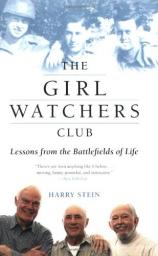Reading Group Guide
Discussion Questions
The Girl Watchers Club: Lessons from the Battlefields of Life

1. How does the Girl Watchers' generation differ from the Baby Boomers? Gen Xers? Forecasters predict Generation Y -- who are now in their teens and early twenties -- to be less focused on career, more family-oriented, and more socially-conscious than Gen Xers. Do you think that they will be the generation most like the Girl Watchers' generation?
2. Why do the Girl Watchers share a deep, intuitive understanding of each other? Do you think subsequent generations will have a similar sense of understanding of their peers?
3. Were you surprised at the amount of premarital sex the Girl Watchers admitted to? Do you think they were telling the truth or is this just "locker room" hyperbole? How would the story differ if it were their wives or a group of women from this generation telling it?
4. The Girl Watchers admire and often adopted the "no-bullshit, full-speed ahead approach to completing the task at hand" quality that was necessary for surviving the war. How did this affect their lives -- personally and professionally -- when they returned from the war?
5. Why are the Girl Watchers' marriages successful? How did living through wartime contribute to their success? Do you think most other marriages from this generation enjoyed the same success as the Girl Watchers, or is this particular to this group of men?
6. When the Girl Watchers get into a discussion about the lack of ethics and morality in society, Cooper comments, "The fact that there is less thievery is just the tip of the iceberg. What we're really talking about is civility. In those days most people just seemed to treat each other with more courtesy than they do now." Do you agree with this statement? If so, do you think it was true for African-Americans, Asian-Americans, and other ethnic groups too?
7. The Girl Watchers disagreed with the United States's participation in the Vietnam War, just as the Baby Boomers who actively demonstrated against it did. One of the Girl Watchers comments, "No question, there was perfectly good reason to dislike the Vietnam war. What I could never understand was how many young people could doubt the fundamental goodness of the country?" Why did the "young people" doubt the United States's "goodness?" Like the Baby Boomers, the Girl Watchers lived through the Civil Rights Movement, assassinations of political leaders, and Watergate. Why didn't the Girl Watchers question United States's "goodness?"
8. The Girl Watchers on death: "Once you've encountered death on the battlefield, it definitely takes away the element of fear." "It just doesn't seem like that big a deal." "Some people today seem to have this idea that dying is just another problem that can be licked. They'll find out otherwise. What matters is feeling you've lived your life well. That makes dying a whole lot easier." How does the Girl Watchers's attitude toward dying differ from other people's? Is their ease with dying because of their wartime service or just because they are older and wiser?
The Girl Watchers Club: Lessons from the Battlefields of Life
- Publication Date: February 1, 2005
- Paperback: 352 pages
- Publisher: Harper Paperbacks
- ISBN-10: 0060936401
- ISBN-13: 9780060936402






